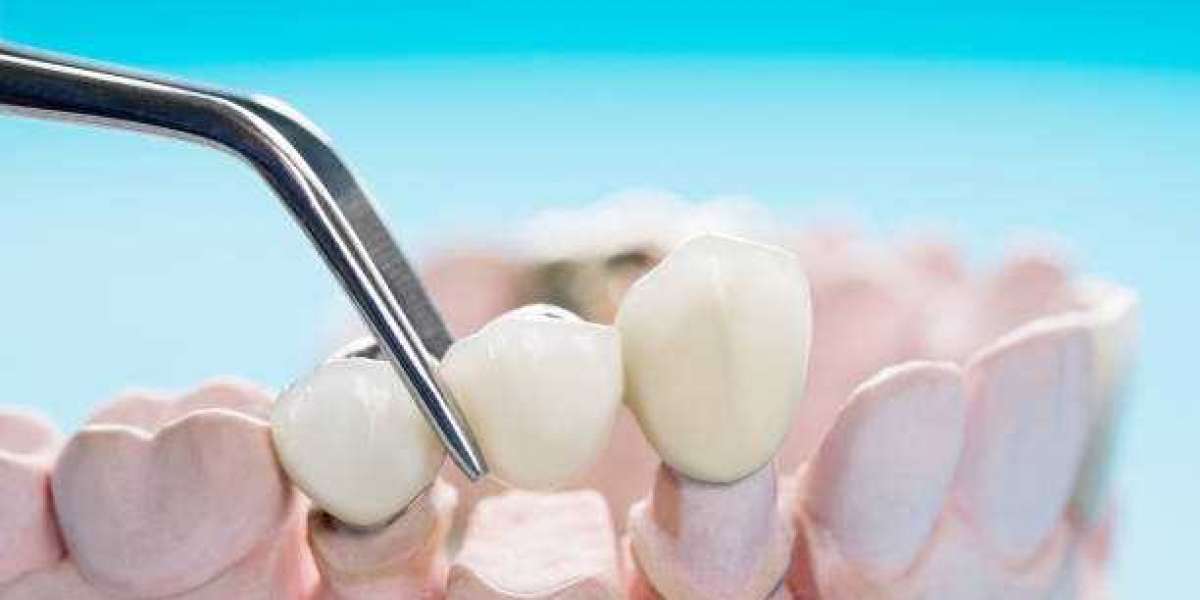A beautiful smile is often one of the first things people notice, but missing teeth can significantly affect your confidence, overall health, and appearance. Fortunately, dental bridges offer an effective solution for filling in the gaps left by missing teeth, improving both functionality and aesthetics. In this blog, we'll explore what dental bridges are, how they work, the types available, and the benefits they provide.
What Are Dental Bridges?
Dental bridges are custom-made dental appliances used to replace one or more missing teeth. They are designed to "bridge" the gap between existing teeth, restoring your smile and functionality to your bite. A typical dental bridge consists of three main parts:
- Pontic: This is the false tooth that fills the gap created by missing teeth.
- Abutments: These are the natural teeth (or implants) that serve as anchors for the bridge.
- Retainers: These are the parts that hold the bridge in place, attached to the abutments.
Bridges can be made from several materials, including porcelain, gold, and alloys. Porcelain is often the preferred choice because it mimics the appearance of natural teeth, blending well with the surrounding teeth.
How Do Dental Bridges Work?
The process of getting a dental bridge typically involves several visits to your dentist and is a straightforward procedure. Here's how it works:
Initial Consultation: The first step is to schedule an appointment with your dentist, who will examine your teeth and determine if a dental bridge is the best option for you. X-rays and impressions may be taken to ensure the bridge fits correctly and that the surrounding teeth are healthy enough to support the bridge.
Tooth Preparation: For traditional bridges, the abutment teeth (the teeth next to the gap) need to be reshaped to make room for the bridge. This usually involves removing a small amount of enamel from these teeth so that the bridge fits securely.
Impressions and Temporary Bridge: Once the abutment teeth are prepared, your dentist will take an impression of your teeth, which will be sent to a dental laboratory where your custom bridge will be fabricated. While the permanent bridge is being made, you may be given a temporary bridge to protect the exposed teeth.
Fitting the Permanent Bridge: Once the permanent bridge is ready, you’ll return to your dentist to have it fitted. The dentist will ensure the bridge fits comfortably, making any adjustments if necessary. The bridge will then be permanently bonded to the abutment teeth.
Follow-Up Care: After the bridge is placed, regular check-ups will be necessary to ensure it is functioning well and that your gums are healthy.
Types of Dental Bridges
Dental bridges come in several types, each designed for specific needs. Here are the most common types:
Traditional Bridges: These are the most common type of bridge and are used when you have healthy teeth on both sides of the gap. The abutment teeth are shaped to allow the bridge to fit over them.
Cantilever Bridges: Cantilever bridges are used when there is only one healthy tooth next to the gap. The bridge is supported by just one abutment tooth, which makes it suitable for specific locations in the mouth where there’s a single missing tooth.
Maryland Bridges: This type of bridge is often used for replacing front teeth. Instead of covering the abutment teeth, the bridge is secured to the back of the adjacent teeth with a metal or porcelain framework, which makes it less invasive than traditional bridges.
Implant-Supported Bridges: These bridges are used when there are multiple missing teeth and the surrounding teeth are not strong enough to support a traditional bridge. Instead of relying on natural teeth, the bridge is anchored by dental implants. This option provides more stability and longevity than traditional bridges.
Benefits of Dental Bridges
Dental bridges offer a wide range of benefits, making them a popular choice for those with missing teeth. Here are some of the top advantages of getting a dental bridge:
Improved Aesthetics: One of the most obvious benefits of a dental bridge is the improvement in appearance. Bridges are designed to match the color and shape of your natural teeth, making them blend seamlessly into your smile. Whether you're missing one or several teeth, a dental bridge can restore your confidence and help you feel comfortable showing off your smile.
Restored Functionality: Missing teeth can make it difficult to chew and speak clearly. A dental bridge restores the functionality of your teeth, allowing you to enjoy your favorite foods without difficulty and speak properly.
Prevents Remaining Teeth from Shifting: When a tooth is lost, the surrounding teeth may begin to shift or tilt into the gap. This can cause further dental problems, including misalignment of the bite. A dental bridge helps prevent this by filling the space and maintaining the alignment of your teeth.
Durability: Dental bridges are made from durable materials that are designed to withstand everyday wear and tear. With proper care, a dental bridge can last for many years, providing long-lasting results.
Improved Oral Health: A missing tooth can affect your overall oral health, leading to bone loss in the jaw and other complications. Dental bridges help restore the structure of your mouth and improve the health of your teeth and gums.
Minimal Maintenance: Once your bridge is in place, it requires little maintenance beyond regular brushing and flossing. It's also important to visit your dentist regularly for check-ups to ensure the bridge is in good condition.
Are Dental Bridges Right for You?
While dental bridges offer many benefits, they may not be suitable for everyone. If your teeth and gums are not in good health, your dentist may recommend other treatment options, such as dental implants or dentures. Additionally, some people may prefer the long-term solution of dental implants, which do not rely on surrounding teeth for support.
It is essential to have a thorough consultation with your dentist to determine the best treatment option for your individual needs.
Final Thoughts
Dental bridges provide an effective and reliable solution for individuals with missing teeth, restoring both the appearance and function of their smile. With various types of bridges available and many benefits to offer, dental bridges are an excellent choice for those looking to regain their confidence and maintain a healthy, functional mouth.








